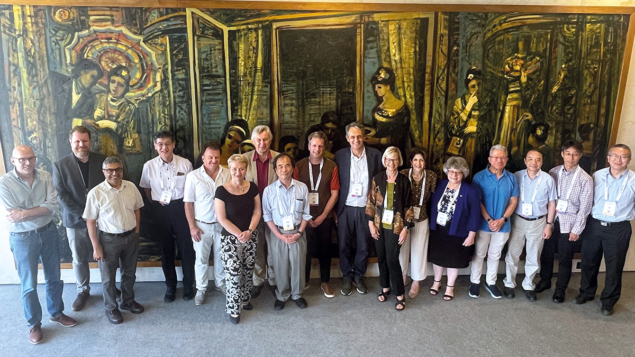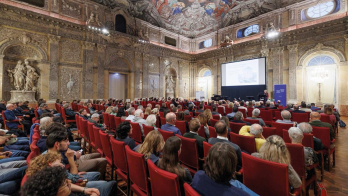
ICFA, the International Committee for Future Accelerators, was formed in 1976 to promote international collaboration in all phases of the construction and exploitation of very-high-energy accelerators. Its 96th meeting took place on 20 and 21 July during the recent ICHEP conference in Prague. Almost all of the 16 members from across the world attended in person, making the assembly lively and constructive.
The committee heard extensive reports from the leading HEP laboratories and various world regions on their recent activities and plans, including a presentation by Paris Sphicas, the chair of the European Committee for Future Accelerators (ECFA), on the process for the update of the European strategy for particle physics (ESPP). Launched by CERN Council in March 2024, the ESPP update is charged with recommending the next collider project at CERN after HL-LHC operation.
A global task
The ESPP update is also of high interest to non-European institutions and projects. Consequently, in addition to the expected inputs to the strategy from European HEP communities, those from non-European HEP communities are also welcome. Moreover, the recent US P5 report and the Chinese plans for CEPC, with a potential positive decision in 2025/2026, and discussions about the ILC project in Japan, will be important elements of the work to be carried out in the context of the ESPP update. They also emphasise the global nature of high-energy physics.
An integral part of the work of ICFA is carried out within its panels, which have been very active. Presentations were given from the new panel on the Data Lifecycle (chair Kati Lassila-Perini, Helsinki), the Beam Dynamics panel (new chair Yuan He, IMPCAS) and the Advanced and Novel Accelerators panel (new chair Patric Muggli, Max Planck Munich, proxied at the meeting by Brigitte Cros, Paris-Saclay). The Instrumentation and Innovation Development panel (chair Ian Shipsey, Oxford) is setting an example with its numerous schools, the ICFA instrumentation awards and centrally sponsored instrumentation studentships for early-career researchers from underserved world regions. Finally, the chair of the ILC International Development Team panel (Tatsuya Nakada, EPFL) summarised the latest status of the ILC Technological Network, and the proposed ILC collider project in Japan.
ICFA noted interesting structural developments in the global organisation of HEP
A special session was devoted to the sustainability of HEP accelerator infrastructures, considering the need to invest efforts into guidelines that enable better comparison of the environmental reports of labs and infrastructures, in particular for future facilities. It was therefore natural for ICFA to also hear reports not only from the panel on Sustainable Accelerators and Colliders led by Thomas Roser (BNL), but also from the European Lab Directors Working Group on Sustainability. This group, chaired by Caterina Bloise (INFN) and Maxim Titov (CEA), is mandated to develop a set of key indicators and a methodology for the reporting on future HEP projects, to be delivered in time for the ESPP update.
Finally, ICFA noted some very interesting structural developments in the global organisation of HEP. In the Asia-Oceania region, ACFA-HEP was recently formed as a sub-panel under the Asian Committee for Future Accelerators (ACFA), aiming for a better coordination of HEP activities in this particular region of the world. Hopefully, this will encourage other world regions to organise themselves in a similar way in order to strengthen their voice in the global HEP community – for example in Latin America. Here, a meeting was organised in August by the Latin American Association for High Energy, Cosmology and Astroparticle Physics (LAA-HECAP) to bring together scientists, institutions and funding agencies from across Latin America to coordinate actions for jointly funding research projects across the continent.
The next in-person ICFA meeting will be held during the Lepton–Photon conference in Madison, Wisconsin (USA), in August 2025.







